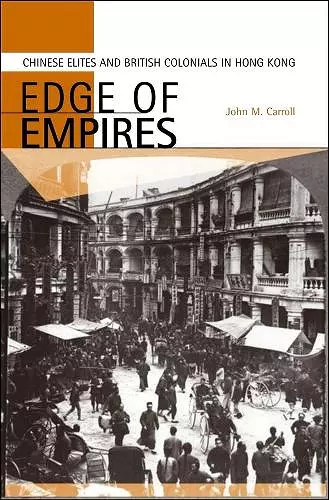Edge of Empires
Chinese Elites and British Colonials in Hong Kong
Format:Hardback
Publisher:Harvard University Press
Published:30th May '05
Currently unavailable, and unfortunately no date known when it will be back

Carroll argues that in the century after the Opium War, an upper middle class appeared among the Chinese in Hong Kong. Western in outlook and education yet Chinese in value and connections, this bourgeoisie collaborated with their British rulers to build a place they considered their own. Chinese endeavors instead of British governance transformed Hong Kong from a collection of 'barren rocks' to a gleaming metropolis of stability and prosperity. Britain's 'crown jewel' thus bore eloquent testimony to a productive encounter between the East and the West. This book fills an important gap in the scholarship on Hong Kong. As a close study of the rise of a Hong Kong-based Chinese bourgeoisie, Edge of Empires has much to offer to current studies of Chinese diaspora, business history, and political culture. It also challenges prevailing theories of global empires and colonialism. -- Wen-hsin Yeh, University of California, Berkeley
In Edge of Empires, Carroll situates Hong Kong squarely within the framework of both Chinese and British colonial history, while exploring larger questions about the meaning and implications of colonialism in modern history.
In an engaging, revisionist study, John M. Carroll argues that in the century after the Opium War, Hong Kong's colonial nature helped create a local Chinese business elite.
By the end of the nineteenth century, the colonial government saw Chinese businessmen as allies in establishing Hong Kong as a commercial center. The idea of a commercially vibrant China united them. Chinese and British leaders cooperated on issues of mutual concern, such as the expansion of capitalism and political and economic directions for an ailing China.
These Chinese also found opportunities in the colonial system to develop business and commerce. In doing so, they used Hong Kong's strategic position to underscore their own identity as a distinctive group unlike their mainland counterparts. Nationalism took on a specifically Hong Kong character. At the same time, by contributing to imperial war funds, organizing ceremonies for visiting British royalty, and attending imperial trade exhibitions, the Chinese helped make Hong Kong an active member of the global British Empire.
In Edge of Empires, Carroll situates Hong Kong squarely within the framework of both Chinese and British colonial history, while exploring larger questions about the meaning and implications of colonialism in modern history.
Even more than most new history monographs, John M. Carroll’s carefully argued, informative study of the Hong Kong bourgeoisie circa 1841–1941 is one that it is easy to imagine readers picking up with very different goals in mind, only to come away with contrasting senses of the novelty and importance of its arguments. The author has interesting things to say about a variety of specific individuals (including colorful figures who moved skillfully between different cultural milieus), institutions (such as the fascinating ‘District Watch’ system of maintaining order in the overwhelmingly Chinese sections of Hong Kong), and events… Carroll has unquestionably done specialists in several fields a service by providing us with such a richly textured picture of the ‘multifaceted process of “embourgeoisment”’ in an intriguing colonial setting, that of a one-time part of the British Empire that since 1997 has ‘not been de-colonized’ but rather ‘re-colonized, with the metropole simply shifting from London to Beijing.’ -- Jeffrey N. Wasserstrom * American Historical Review *
Carroll argues that in the century after the Opium War, an upper middle class appeared among the Chinese in Hong Kong. Western in outlook and education yet Chinese in value and connections, this bourgeoisie collaborated with their British rulers to build a place they considered their own. Chinese endeavors instead of British governance transformed Hong Kong from a collection of ‘barren rocks’ to a gleaming metropolis of stability and prosperity. Britain’s ‘crown jewel’ thus bore eloquent testimony to a productive encounter between the East and the West. This book fills an important gap in the scholarship on Hong Kong. As a close study of the rise of a Hong Kong–based Chinese bourgeoisie, Edge of Empires has much to offer to current studies of Chinese diaspora, business history, and political culture. It also challenges prevailing theories of global empires and colonialism. -- Wen-hsin Yeh, University of California, Berkeley
- Nominated for Morris D. Forkosch Prize 2005
- Nominated for Joseph Levenson Book Prize 2007
ISBN: 9780674017016
Dimensions: unknown
Weight: unknown
274 pages